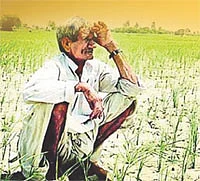
Forty-seven per cent of farmers in the State depend on informal sector for loans, despite the claim of Karnataka achieving 100 per cent financial inclusion for farmers.
The report, titled ‘Farm Sector in Karnataka: Farmers’ Indebtedness and Risk Management’ lays bare the shortcomings of of institutional finance for farming and traces the causes of farmers’ indebtedness. Field surveys were conducted in Chamarajnagar, Haveri and Mandya districts as part of the study commissioned by the State Department of Planning and Statistics. The exercise lasted for a year and included an analysis of the National Sample Survey Organisation (NSSO) data on farmers of the State.
Collateral security
Majority of the loans from the formal sector require collateral security whereas in the case of loans from informal sector, about 80 per cent of the borrowers do not provide any security. In the case of the poorest farmers (holding up to one acre), 96 per cent provide no security to the lender. It was found that a large number of farmers who did not avail loans from formal sector, were not in possession of land records.
In the case of informal lenders, borrowers continued to pay interest for a very long period without repaying any part of the principal. Thus, in addition to charging a higher interest rate, the borrower ensures that the principal remained unpaid for a long time. In the process, borrowers tend to repay much more than the principal sum.
The report points to the lacunae in the farm credit system. The financial needs of farming vary with various stages of agricultural operations, while the banks extend loans at one go in the initial stages itself. Money unutilised for two months gets spent for other purposes leaving the farmers high and dry during harvesting. With no other go, they are compelled to approach the informal lenders. Even if a farmer avails loan from financial institutions, the loan size would be inadequate to meet the demand. The study found the role of co-operative societies minimal, though in Mandya, farmers had access to the facility.
Loan waiver
The study found that only 23.50 per cent of marginal farmers benefited from the loan waiver in Chamarajnagar and the situation was no different in the remaining two districts. Almost all the farmers faced crop loss due weather vagaries once every two years.
While the crop loss could be mitigated through insurance, the benefit was found to have been not much popular. The survey showed only 17 per cent of the households availed insurance and around 40 per cent were not interested in the scheme. The reason - the scheme is usually based on the area and hence farmers were wary of getting compensation.
The report also says that farmers lack information and imagination. Setting up a petty shop or buying an asset (like tractor) for hiring purpose seems to be the only option for them, it says.
Prof Meenkashi Rajeev and Prof B P Vani of ISEC conducted the study.
